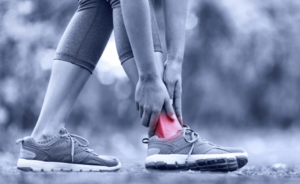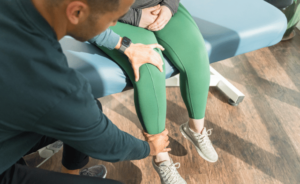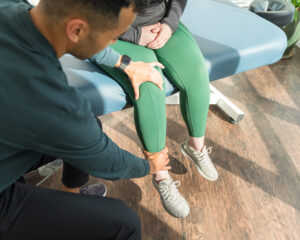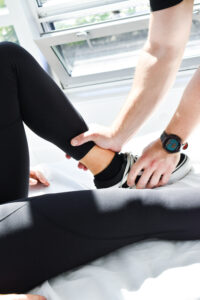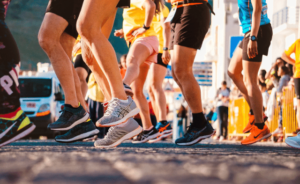Whether you’re training for the Vancouver Marathon or tackling a long-distance race for the first time, the way you prepare can make or break your performance. While consistency is key, many runners unknowingly make costly mistakes that lead to serious running injuries, slower race times, and even long-term damage.
This is where running physiotherapy in Vancouver comes in. Many runners believe that physio is only for injury recovery, but the truth is, working with a downtown Vancouver physiotherapy clinic can help you prevent common training mistakes before they lead to pain, setbacks, or missed races. By incorporating physiotherapy into your training plan, you can improve your biomechanics, strengthen key muscles, and develop a structured approach to training that keeps you injury-free.
From IT band syndrome and Achilles tendinitis to stress fractures and runner’s knee, physiotherapists specializing in running injuries can help you address weaknesses, optimize recovery, and fine-tune your running mechanics. The right strategies can mean the difference between crossing the finish line strong or limping off the course with an injury.
In this post, we’ll cover the five most costly mistakes marathon runners in Vancouver make—and how running physiotherapy at Vancouver Physiotherapy Hub can help you stay pain-free, improve your speed, and achieve your race-day goals.
Let’s dive in!
Book a downtown Vancouver physiotherapy session at the first sign of discomfort.
Mistake #1: Ignoring Running-Related Aches & Pains – How Vancouver Physiotherapy Hub Can Prevent Chronic Injuries
Running Pain & Why It Is Costly
Many marathon runners push through pain, assuming it’s normal. However, minor aches can quickly turn into Achilles tendinitis, IT band syndrome, or stress fractures—leading to months of rehab or even surgery. Ignoring early warning signs can derail your training and race goals.
Click here to learn the 5 most common running injuries.
How Physiotherapy for Running Can Help
A running physiotherapist in Vancouver can identify movement imbalances, muscle weaknesses, and training errors before they cause serious injuries.
💡 Key Treatment Strategies:
Soft Tissue Release for Muscle Recovery
- Myofascial release & deep tissue massage – Relieves tightness, improves flexibility and reduces injury risk.
- IASTM (Instrument-Assisted Soft Tissue Mobilization) – Breaks down adhesions to promote better movement.
Joint Mobilization for Better Running Mechanics
- Hip, knee, and ankle mobilizations – Prevent stiffness and improve efficiency.
- Spinal adjustments – Correct posture and alignment to reduce lower body strain.
IMS (Intramuscular Stimulation) for Chronic Pain & Tightness
- Acupuncture-like dry needling – Releases deep muscle tension and restores nerve function.
- Best for runners with nerve-related pain or persistent tight muscles.
Strength Training for Injury Prevention
- Single-leg exercises, glute activation, and calf raises – Improve stability, endurance, and shock absorption.
Running Gait Analysis to Optimize Form
- Visual-based analysis – Identifies inefficiencies like overstriding or excessive heel striking.
- Stride correction drills & footwear recommendations – Improve efficiency and reduce impact forces.
📖 Learn Why Strength Training is Essential for Runners
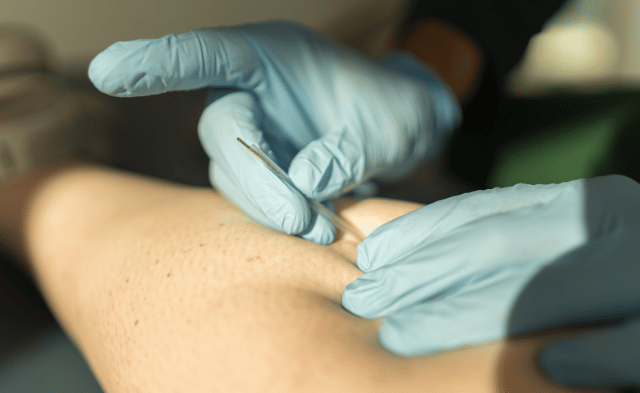
Mistake #2: Skipping Strength Training – Why Vancouver Physiotherapy Hub Recommends It
Why Skipping Strength Training Is Costly
Many marathon runners prioritize mileage over strength training, assuming that logging more kilometers is the key to performance. While endurance is crucial, neglecting strength work weakens key muscle groups, leading to poor running mechanics, reduced efficiency, and a higher risk of overuse injuries like:
🚨 Runner’s knee – Caused by weak quads and hips, leading to improper knee tracking.
🚨 Achilles tendinitis – Results from calf muscle imbalances and poor ankle stability.
🚨 Shin splints – Often due to weak tibialis anterior muscles and excessive impact.
Without proper muscle conditioning, your body compensates in ways that increase strain on joints, tendons, and ligaments, ultimately leading to pain and setbacks in training.
How Running Physiotherapy in Vancouver Can Help
At Vancouver Physiotherapy Hub, we emphasize strength training as a critical part of marathon preparation. Our physiotherapists assess muscle imbalances, biomechanics, and injury risk factors to create a customized strength program that enhances running efficiency.
💡 Essential Strength Training for Runners:
- Single-leg squats & step-ups – Strengthen knee and hip stabilizers, reducing stress on joints.
- Glute activation exercises (bridges, clamshells, band walks) – Prevent IT band syndrome and lower back pain by stabilizing the pelvis.
- Calf raises & foot strengthening drills – Improve Achilles tendon resilience and arch support, reducing plantar fascia strain.
- Core stabilization (planks, dead bugs, Pallof presses) – Enhances posture and running mechanics, preventing lower back discomfort.🏃 Tip: Strength training doesn’t have to be time-consuming—adding two 30-minute sessions per week can boost endurance, enhance power, and reduce injuries.
Mistake #3: Overtraining Without Proper Recovery – Why Vancouver Physiotherapy Hub Helps You Train Smarter
Why Overtraining Without Recovery Is Costly
Many marathon runners fall into the trap of doing too much, too soon—believing that more mileage equals better results. However, without adequate recovery, your body doesn’t have time to rebuild and strengthen itself. Overtraining can lead to:
🚨 Fatigue & burnout – Decreased performance, sluggishness, and poor sleep.
🚨 Overuse injuries – Stress fractures, Achilles tendinitis, and IT band syndrome.
🚨 Weakened immune system – Making runners more susceptible to illness before race day.
Skipping rest days, ignoring warning signs of fatigue, and failing to implement proper recovery techniques can result in months of lost training time due to injury.
How Running Physiotherapy in Vancouver Can Help
At Vancouver Physiotherapy Hub, our physiotherapists help runners balance training intensity and recovery to prevent injury and optimize performance.
💡 Key Recovery Strategies for Marathon Runners:
- Active recovery (cycling, swimming, mobility work) – Maintains fitness while reducing joint stress.
- Sports massage & myofascial release – Relieves muscle tightness and promotes circulation.
- Intramuscular Stimulation (IMS) – A dry needling technique that releases deep muscle tension and resets tight nerves.
- Sleep & hydration optimization – Supports muscle repair and energy levels.
Tip: Don’t wait until fatigue turns into injury—schedule regular recovery-focused physiotherapy sessions to stay strong throughout training.
Mistake #4: Poor Running Form & Gait Mechanics – Why Gait Analysis at Vancouver Physiotherapy Hub Is Essential
Why Poor Running Form Is Costly
Many runners unknowingly develop inefficient movement patterns that waste energy and put excessive strain on joints. Over time, these biomechanical issues can lead to chronic injuries like:
🚨 Shin splints – Caused by excessive impact due to poor foot strike.
🚨 Runner’s knee – Often linked to weak hip stabilizers and improper knee alignment.
🚨 Achilles tendinitis – Can result from overstriding and excessive heel striking.
If you frequently experience niggling pains or recurring injuries, it may be due to an inefficient running gait.
How Running Physiotherapy in Vancouver Can Help
A running gait analysis at Vancouver Physiotherapy Hub can identify movement inefficiencies and correct faulty biomechanics before they lead to serious injuries.
💡 Gait Correction Strategies:
- High-speed video analysis – Pinpoints imbalances in stride length, foot strike, and posture.
- Footwear & orthotic recommendations – Helps address issues like collapsed arches or excessive pronation.
- Cadence & stride drills – Optimizes movement efficiency to reduce impact forces.
- Strength & mobility exercises – Targets weak areas affecting gait mechanics.
📖 Learn How Gait Analysis Helps Runners
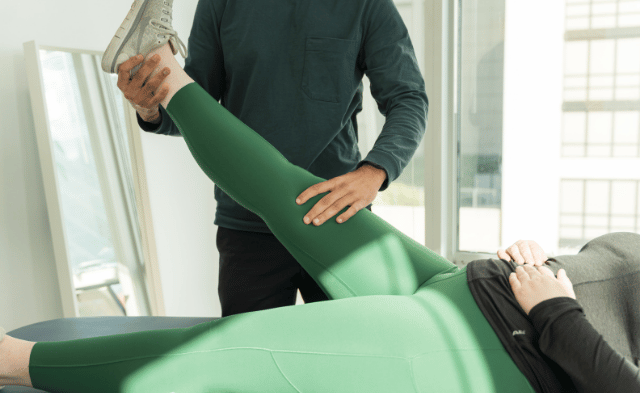
Mistake #5: Neglecting Race Day Preparation & Nutrition – Why Physiotherapy for Marathon Runners in Vancouver Covers More Than Injuries
Why Poor Race Preparation Is Costly
Many runners train hard but overlook key race-day strategies, leading to energy crashes, dehydration, and pacing mistakes. Without a proper nutrition and hydration plan, even the most well-conditioned runners can struggle with:
🚨 Muscle cramps – Caused by electrolyte imbalances and dehydration.
🚨 Hitting the wall – Resulting from poor carbohydrate loading or inadequate fueling.
🚨 Excess fatigue – Often due to poor sleep, lack of tapering, or an inconsistent pacing strategy.
Race day success is about more than just training—it requires smart preparation and execution.
How Running Physiotherapy in Vancouver Can Help
At Vancouver Physiotherapy Hub, we provide comprehensive race preparation strategies to help runners maximize endurance and efficiency on race day.
💡 Essential Race-Day Tips for Marathon Runners:
- Hydration & electrolyte balance – Prevents cramps and overheating.
- Carbohydrate loading strategies – Ensures sustained energy throughout the race.
- Pacing drills & race simulations – Helps avoid burnout in the early miles.
- Tapering guidance – Allows muscles to fully recover before race day.
🏃 Tip: Never experiment with new foods, hydration strategies, or gear on race day—stick to what worked in training!
Learn more about physiotherapy for runners.
Final Thoughts – Stay Injury-Free with Running Physiotherapy in Vancouver
Marathon training is a huge physical and mental commitment, and the last thing any runner wants is to be sidelined by an avoidable injury. Skipping strength training, overtraining without proper recovery, running with poor form, ignoring early aches and pains, or failing to plan for race day can jeopardize your performance, delay your progress, and even force you to withdraw from the race entirely.
By working with Vancouver Physiotherapy Hub, you can train smarter, not just harder. Our team specializes in running physiotherapy and provides comprehensive injury prevention strategies, personalized treatment plans, and expert guidance to keep you running strong. Whether you need injury rehab, strength programming, running gait analysis, or recovery support, our clinic is dedicated to helping you reach your goals pain-free.
What You Can Do Next to Stay Injury-Free
- Listen to your body. Don’t ignore discomfort—addressing small aches early can prevent major setbacks.
- Prioritize strength training. A stronger body means better mechanics, less strain, and more efficient running.
- Recover intentionally. Use active recovery, sports massage, and IMS therapy to support your muscles and prevent overuse injuries.
- Fix your form. A running gait analysis can identify inefficiencies and help you move more efficiently.
- Plan for race day. Hydration, nutrition, and pacing strategies can make or break your marathon.
Let Vancouver Physiotherapy Hub Help You Reach the Finish Line!
If you’re struggling with nagging pain, inefficient form, or injury concerns, now is the time to invest in your training and performance with expert downtown Vancouver physiotherapy. Our team is here to help you prevent injuries, optimize recovery, and ensure you’re race-ready.
Don’t wait until an injury forces you to stop running! Book a running physiotherapy session at Vancouver Physiotherapy Hub today and take the next step toward a stronger, injury-free marathon experience.

